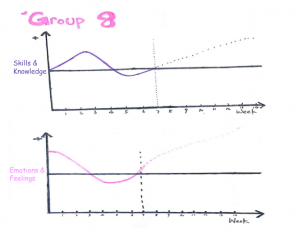Weekly Objectives and Achievements
Past objective 1: Gain a better understanding of the Vancouver Food Asset Map (VFMA) usage demographic, and its effectiveness.
Achievements:
- We achieved this objective.
- We visited the East Vancouver Youth Clinic and were able to interact with community members to gain their feedback on the Food Asset Map.
- We collected 15 evaluation forms from the community members.
Past objective 2: Compile detailed information on different food preferences available at individual food assets.
Achievements:
- We partially achieved this objective.
- We contacted Free/Low Cost food assets in order to update information regarding culturally appropriate foods
- We are still in the process of contacting all of the food assets listed under free/low cost meals and grocery stores/retail markets. Unfortunately, many of the organizations have not yet provided feedback regarding our inquiry.
Past objective 3: Consolidate our learning in LFS 350 and gain community feedback on our project
Achievements:
- We gained valuable community feedback regarding their opinions and the usefulness of the VFAM.
- We created awareness of the Vancouver Food Asset Map amongst the general public at the youth clinic
Our objectives for the upcoming weeks are:
- Find alternative ways to contact organizations that have not yet responded (phone, in-person visits where possible).
- Contact grocery stores and small retail markets and update their information.
- Consolidate all of the data from community members into the document provided by VCH.
Tutorial Workshop and Moment of Significant Change
We began the tutorial by reflecting on the advantages and disadvantages of our personal identities (race, gender and social status) when working in diverse groups and community projects. Next, we individually reflected on our experiences in the course so far by drawing graphs of our progress and how we feel about our learning. After this, we had an in-group discussion and compiled our own graphs into one.
After discussion, we found it interesting that our whole group had similar patterns on our graphs. We noticed that we all began the course with excitement, but slowly became less enthusiastic as the uncertainty of our project escalated. However, frequent meetings with our group and open communication has helped us support each other through this uncertainty, and now we feel like we are on the right track.
It had been frustrating for some of us to get in contact with community partners while others have been successful. In addition, some of us faced challenges interacting with community members and gaining their trust and feedback. During map trialing in the community, we encountered an unexpected challenge when the coordinator was absent, and the person she had informed to fill in for her was sick and also absent. However, after deliberation, we were able to speak with a different worker and initiate the map trialling on our own. Thanks to the many different backgrounds, personalities, and personal experiences of our group members, we have been able to overcome these difficulties that arose throughout the understanding and facilitation of this project, including the frustration that occurred when working with outside organizations and members of the community. We know that diversity in groups contributes to a more successful and efficient completion projects (Mcleod, Lobel, & Cox, 1996), and therefore are confident that we can continue on this path for a graceful dismount.

A Graceful Dismount
To ensure success :
- We have arranged weekly meetings every Thursday evening when we are all available to optimize group collaboration and communication
- We will analyze data collected from the community members into an infographic and state the findings in a report.
- We will enter data from food assets into the VCH information excels to update information.
- We will compile all of our data into documents to submit all together to VCH.
- We will reflect on the unsolved challenges of this project and provide suggestions for future collaborators working on this project.
Reference:
Mcleod, P. L., Lobel, S. A., & Cox, T. H. (1996). Ethnic Diversity and Creativity in Small Groups. Small Group Research,27(2), 248-264. doi:10.1177/1046496496272003.